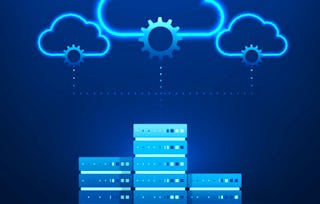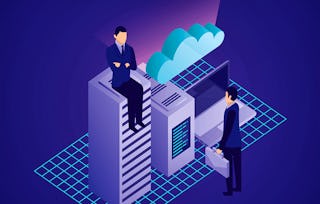AWS: Databases Course is the second course of Exam Prep (DEA-C01): AWS Certified Data Engineer - Associate Specialization. This course assists learners in designing relational and non-relational databases using AWS services. This course focuses on configuring No-SQL and Graph databases using Amazon DocumentDB, Amazon DynamoDB, Amazon Keyspaces, and Amazon Neptune. The course also guides implementing relational and data warehouses using Amazon RDS and Amazon Redshift respectively. This course is divided into two modules and Lessons and Video Lectures further segment each module. This course facilitates learners with approximately 3:00-3:30 Hours of Video lectures that provide both Theory and Hands-On knowledge. Also, Graded and Ungraded Quizzes are provided with every module to test the ability of learners.

AWS: Databases

AWS: Databases
This course is part of Exam Prep (DEA-C01): AWS Certified Data Engineer - Associate Specialization

Instructor: Whizlabs Instructor
Included with
Recommended experience
What you'll learn
Understand to configure relational databases in AWS.
Learn to examine data warehouse solutions in AWS.
Identify ways to configure non-relational databases in AWS.
Skills you'll gain
Details to know

Add to your LinkedIn profile
6 assignments
See how employees at top companies are mastering in-demand skills

Build your subject-matter expertise
- Learn new concepts from industry experts
- Gain a foundational understanding of a subject or tool
- Develop job-relevant skills with hands-on projects
- Earn a shareable career certificate

There are 3 modules in this course
Welcome to Week 1 of the AWS: Databases course. In this week, you will be introduced to Relational Database and Data Warehouse services in AWS. You will learn the concept of Amazon RDS. You will explore some of Amazon Redshift's features such as Automatic Table Optimization, Column Compression, and Stored Procedures. By the end of the week, you will learn how to work with SQL queries using Amazon Redshift.
What's included
10 videos2 readings2 assignments1 discussion prompt
Welcome to Week 2 of the AWS: Databases course. This week, you will be introduced to Non-Relational Databases in AWS. You will explore Amazon DynamoDB Accelerator (DAX) which is a fully managed, highly available caching service built to improve performance for Amazon DynamoDB. By the end of the week, you will learn the advanced features of Amazon DynamoDB with its components.
What's included
10 videos1 reading2 assignments1 ungraded lab
Welcome to Week 3 of the AWS: Databases course. This week, you will be introduced to Amazon Keyspaces, Amazon MemoryDB for Redis, and Amazon Neptune in AWS. You will learn the features and use cases of other non-relational databases in AWS. By the end of the week, you will understand the difference between MemoryDB for Redis and ElastiCache for Redis.
What's included
6 videos3 readings2 assignments
Earn a career certificate
Add this credential to your LinkedIn profile, resume, or CV. Share it on social media and in your performance review.
Instructor

Offered by
Explore more from Software Development
 Status: Free Trial
Status: Free Trial Status: Free Trial
Status: Free TrialWhizlabs
 Status: Free Trial
Status: Free TrialWhizlabs
 Status: Preview
Status: Preview
Why people choose Coursera for their career

Felipe M.

Jennifer J.

Larry W.

Chaitanya A.

Open new doors with Coursera Plus
Unlimited access to 10,000+ world-class courses, hands-on projects, and job-ready certificate programs - all included in your subscription
Advance your career with an online degree
Earn a degree from world-class universities - 100% online
Join over 3,400 global companies that choose Coursera for Business
Upskill your employees to excel in the digital economy
Frequently asked questions
To access the course materials, assignments and to earn a Certificate, you will need to purchase the Certificate experience when you enroll in a course. You can try a Free Trial instead, or apply for Financial Aid. The course may offer 'Full Course, No Certificate' instead. This option lets you see all course materials, submit required assessments, and get a final grade. This also means that you will not be able to purchase a Certificate experience.
When you enroll in the course, you get access to all of the courses in the Specialization, and you earn a certificate when you complete the work. Your electronic Certificate will be added to your Accomplishments page - from there, you can print your Certificate or add it to your LinkedIn profile.
Yes. In select learning programs, you can apply for financial aid or a scholarship if you can’t afford the enrollment fee. If fin aid or scholarship is available for your learning program selection, you’ll find a link to apply on the description page.
More questions
Financial aid available,

